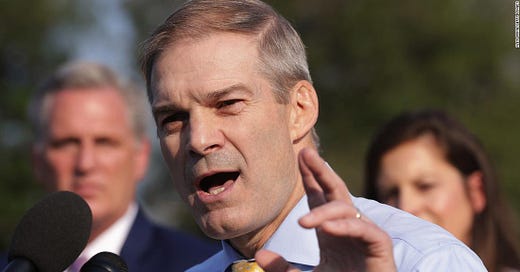
Today, the Pentagon ordered up to 8500 troops to go on standby in case they are needed to defend Ukraine against Russian aggression. The troops have not been activated. If they are, they will deploy to nations allied with the North Atlantic Treaty Organization (NATO), nations like Poland or Lithuania or Latvia, to provide help with logistics, medical needs, intelligence, and so on. If activated, the troops will not be authorized to enter Ukraine.
Here’s the story of how we got here:
The USSR dissolved in 1991 under pressure from a new alliance of Russia, Belarus, and Ukraine, joined by most of the other Soviet republics. Quickly, well-connected businessmen in those former republics began to amass wealth and power. At the same time, the fall of the Soviet Union prompted lawmakers in the U.S. to champion the free enterprise they were convinced had sunk the Soviets. They deregulated the U.S. financial industries just as rising oligarchs in Eastern Europe were eager to launder illicit money.
In 1999, Poland, Hungary, and the Czech Republic, all former satellites of the USSR, joined NATO over the protests of Russia, which was falling under the control of oligarchs who opposed western democracy. More countries near Russia joined NATO in the 2000s.
Russia set out to keep control of Ukraine. In 2004, it appeared to have installed a Russian-backed politician, Viktor Yanukovych, as president of Ukraine, but Yanukovych was rumored to have ties to organized crime, and the election was so full of fraud—including the poisoning of a key rival who wanted to break ties with Russia and align Ukraine with Europe—that the government voided the election and called for a do-over.
In 2004, Yanukovych began to work with U.S. political consultant Paul Manafort, who was known for managing unsavory characters, and in 2010, Yanukovych finally won the presidency on a platform of rejecting NATO. Immediately, Yanukovych turned Ukraine toward Russia. But in 2014, after months of popular protests, Ukrainians ousted Yanukovych from power in what is known as the Revolution of Dignity. He fled to Russia.
Shortly after Yanukovych’s ouster, Russia invaded Ukraine’s Crimea and annexed it, prompting the United States and the European Union to impose economic sanctions on Russia itself and also on specific Russian businesses and oligarchs, prohibiting them from doing business in U.S. territories. Since Russians had been using U.S. financial instruments to manage their illicit money, these sanctions froze the assets of key Russian oligarchs.
Putin wanted to get the sanctions lifted. At the same time, with Yanukovych out of power, Manafort was out of a job and in debt to his former friends. In summer 2016, Manafort began to manage the presidential campaign of Republican candidate Donald Trump. Shortly afterward, the Trump campaign changed the Republican Party’s 2016 platform to weaken its formerly strong stance against Russia and in defense of Ukraine.
Trump won the election, of course, and an investigation by the Republican-led Senate Intelligence Committee concluded that Russia had worked to get Trump elected and that Manafort had shared campaign information with his own former partner, a man the senators identified as a Russian operative.
Under Trump, American policy swung Putin’s way as Trump attacked NATO and the European Union, weakened our ties to our traditional European allies, and threatened to withdraw our support for Ukraine.
That policy changed when Biden took office. His administration renewed support for Ukraine and its move toward stronger ties to NATO and the European Union. At the same time, it has dramatically cracked down on money laundering, shell companies, and the movement of illicit money.
The U.S. began to take note that Russia was massing troops on its border with Ukraine last November. Rather than act unilaterally, the Biden administration immediately reached out to European allies and sent senior U.S. officials to Russia to meet with officials there, at the same time reassuring Ukraine officials that the U.S. would continue its support for Ukraine’s territorial integrity. When Putin worked with Belarus president Alexander Lukashenko to destabilize Poland by pushing migrants over the border, he helped to strengthen NATO’s unity, until now countries like Finland and Sweden, which are not NATO members, are considering joining.
The question at home is whether today’s Republicans will stand with Ukraine, NATO, and the rule of law that says sovereign countries have the right to determine their own alliances. If they support another Russian invasion of Ukraine, they will weaken NATO and the stands the U.S. and the European Union have taken to clean up global finances to stop oligarchs from amassing the power that comes from illicit money.
Since November, Fox News Channel personality Tucker Carlson has led the U.S. defense of Russia, echoing Russian talking points and suggesting that there is no reason for the U.S. to support Ukraine. (In November, when he asked of Representative Mike Turner (R-OH) why the U.S. should side with Ukraine over Russia, Turner noted that Ukraine is a democracy, “Russia is an authoritarian regime,” and that America is “for democracy” and “not for authoritarian regimes.”)
But the Republicans are split on the issue. Many are criticizing Biden not for his stand against Russian aggression, but because they say he has not been tough enough about it. National Review editorialized today that Biden should be moving weapons to Ukraine more quickly, the Wall Street Journal said the same on January 19, and Breitbart has called for impeaching Biden for not pushing back strongly enough against Russia.
While the Republicans are focusing on a unilateral military approach to the situation before Putin makes another move into Ukraine, Chairman of the Senate Foreign Relations Committee Bob Menendez (D-NJ), along with 38 colleagues, has introduced legislation to impose sanctions on the Russian banking sector, senior military and government officials, and Russia’s extractive industries, as well as cut Russia out of the SWIFT global transaction system, if Putin escalates hostilities. It authorizes another $500 million in assistance to Ukraine if Russia reinvades, and it seeks to counter disinformation coming from the Kremlin. Republican lawmakers are in talks with their Democratic counterparts over the bill.
At stake in this crisis is the concept of the international rule of law. The obvious question is whether nations should control their own borders and governments, or whether larger countries can absorb others in a sphere of influence. But there is also the question of money: oligarchs have risen to power thanks in part to the financial systems that enabled them to amass and launder illicit money that they then used to manipulate the politics of other countries. Under Biden, the U.S. and our allies are trying to strengthen democracies by getting rid of the loopholes that have helped illicit money poison democratic politics. The economic sanctions that Republicans are finding weak sauce might, in the end, reach far beyond Ukraine.
—
Notes:



https://www.reuters.com/world/us/us-senators-work-bipartisan-bill-aid-ukraine-2022-01-19/







Methinks following Russian money will lead into the pockets of many of the Republican lawmakers now deciding what US response should be to potential Russian militarism in Ukraine. I include Mitch McConnell in that list. It certainly would explain much of the otherwise irrational devotion to Trump by so many Republicans.
Heather is too polite to explicitly call out the GOP's incentives.
Multiple investigations and court cases have indicated Russia spent money on behalf of the GOP in USA elections, especially in the 2016 cycle. If the USA's response to Russian aggression against Ukraine is heavily financial, it could impede that financial support. If there is a hot war instead, Republican donors at home (not many Democrats control the finances of big defense contractors) stand to make a lot of money from it and there will be plenty of chaos for foreign money and influence to sneak through.
Of course the GOP wants Biden to go for a military solution right away.
I live in the UK. We get some of our natural gas from Russia. Continental Europe gets a bigger proportion of theirs from Russia than we do. Russia will retaliate by cutting gas supply. Our already-spiking heating prices will spike even worse and that will cause a lot of pain. But Europe remembers what it is like to have a world war fought all over its lands and peoples. A choice between cold houses with financial pain and another great war is not a difficult choice at all.
Take the Republicans on a field trip to Kiev without their body armor and maybe they'll start to see it this way.